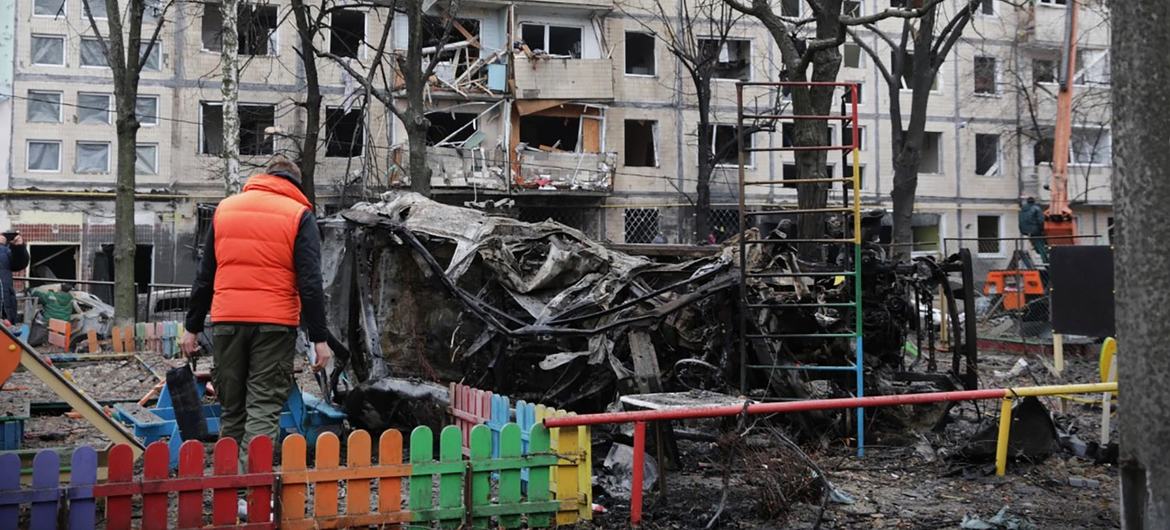
Ukraine: Türk calls on Russia to silence the guns in appeal for ‘a just peace’
© UNOCHA/Viktoriia Andriievska | A resident stands in front of his apartment building in Kyiv which was in an overnight strike in December 2023.
United Nations, 19 December 2023
The UN Human Rights Council in Geneva was briefed by High Commissioner Volker Türk on Tuesday who described “a litany of continuous suffering” in Ukraine in the wake of Russia’s continuing invasion.
Since the onset of the invasion the UN human rights office (OHCHR) has meticulously monitored the situation. As of December 4, there have been over 10,000 civilian deaths, including 560 children, with an additional 18,500 civilians confirmed injured, with actual figures believed to be much higher due to the difficulties of verifying figures.
“I feel for the Ukrainians, who have a right to peace, and who deserve peace, in line with the UN Charter and international law. Instead, I fear that protracted and entrenched conflict will impact lives and human rights for generations to come,” warned the High Commissioner.
The Human Rights Monitoring Mission in Ukraine (HRMMU) has diligently documented the crisis using a methodology developed over decades. Mr. Türk highlighted the findings, revealing gross violations of international human rights and serious breaches of international humanitarian law, primarily by Russian forces.
Report’s findings
Between 1 August and 30 November, 2,440 civilian deaths and injuries were documented.

The data showed a 25 per cent decrease compared to the previous four months and a 46 per cent compared with the same period in 2022, attributed to factors such as frontline stabilization, civilian evacuations, and strengthened air defense systems.
Most of those killed were in the areas of Donetsk, Kharkiv, Kherson and Zaporizhzhia near the frontlines, with a disproportionate number of older people among the casualties, as they were unwilling or unable to relocate.
The majority of civilian casualties, 86 per cent, occurred in territory controlled by Ukraine, while the remaining 14 per cent – areas under Russian control.
Missile threat
However, being away from the frontline is no guarantee of safety, with missile attacks launched by the Russian armed forces regularly launched against targets in densely populated residential areas. Attacks on Kyiv in the past few days wounded over 50 people and damaged numerous buildings.
“People across the country do not feel safe,” Mr. Türk said, adding that attacks have also targeted grain storage and transport facilities that constitute protected civilian objects under international humanitarian law.
Over 1,300 education and health facilities have been damaged or destroyed since February 2022, with more than 100 incidents reported in the last four months. Mines and explosive materials continue to threaten lives.
Human rights violations
In Russian-occupied territories, documented patterns of arbitrary detention, enforced disappearance, and widespread abuse by Russian armed forces continue to be reported.
Despite lacking access to Russian detention centers, OHCHR highlighted at least 100 civilian deaths resulting from arbitrary detention, incommunicado detention, and enforced disappearance.
The report mentions thorough examination of six new cases of Russian soldiers killing civilians in occupied territory.
“The Russian authorities announced the arrest of two Russian soldiers in connection with the killing of a family of nine, including two children, in Volnovakha, in Donetsk oblast. There are also indications that an investigation has been opened into a second case that we have verified, in which a couple was killed in Maly Kopani, Kherson oblast,” Mr. Türk said.
He also reminded that under international law the occupying power must maintain the status quo, to the extent possible, and criticized Russian attempts to impose its own laws and practices in violation of international law – even conscripting Ukrainian men to serve in the Russian military.
Call on Ukrainians
On the Ukrainian side, Mr. Türk urged authorities to narrow the definition of “collaboration” in prosecutions, expressing concern over convictions related to what are lawful activities.
As of 30 November, some 8,600 criminal charges have been filed by authorities in Kyiv in relation to alleged collaboration, with courts ordering, in most cases, that the accused remain in custody pending trial.
Many have been convicted for conduct that could be lawful – including, for example, working to ensure the continued functioning of social services and schools in occupied areas.
The High Commissioner also noted concerns regarding freedom of religion and belief in Ukraine, given continuing action by Kyiv against the Ukrainian Orthodox Church. A draft law under consideration, he added, could lead to the dissolution of any religious organization with ties to Russia, which is not in compliance with international human rights law.
Respect human rights
Mr. Türk appealed to all States to push for immediate and decisive measures by both parties, particularly the Russian Federation, to comply with international human rights and humanitarian law.
He called for an end to the use of explosive weapons in populated areas, timely investigations into allegations of violations, and the need for accountability for perpetrators.
Mr. Türk called on Russia to allow access by independent monitors to places of detention and an end to conscription of civilians.
He urged Ukraine to align all laws with international standards, protect freedom of religion, and swiftly adopt a national strategy for the protection of civilians.
“Ultimately, there is only one solution to this tragic and far-reaching conflict: a just peace,” the rights chief said.
Citing General Assembly Resolution ES-11/1 and the binding order by the International Court of Justice, he called on Russia to immediately cease its use of force against Ukraine.
The original article appeared here.